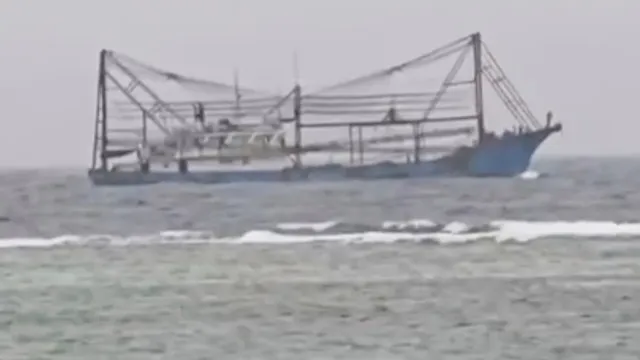
Chinese fishing vessel runs aground near Philippines-occupied island amid rising tensions
2025-06-08 06:38- A Chinese ship ran aground in shallow waters near Thitu Island on Saturday due to stormy weather.
- Local Filipino villagers alerted military personnel regarding the stranded vessel.
- The incident exemplifies ongoing tensions between China and the Philippines in the disputed waters.
Express your sentiment!
Insights
On Saturday, a Chinese fishing vessel ran aground in stormy weather off the coast of Thitu Island, which is occupied by the Philippines in the contested South China Sea. Philippine military officials reported that the vessel became stranded in shallow waters due to adverse weather conditions. Local Filipino villagers noticed the ship lying in the shallows about 1.5 nautical miles from their fishing village, prompting them to alert the Philippine military and coast guard. Officials deployed to the scene to offer assistance, but by the time they arrived, the vessel had already been extricated by other Chinese ships. Col. Xerxes Trinidad of the Armed Forces of the Philippines stated that the alertness of their troops is always maintained, especially in sensitive areas like the South China Sea. The region has seen an increase in confrontations between Chinese vessels and those of the Philippines in recent years, fueled by ongoing territorial disputes. The Philippines and China both lay claim to various areas within the South China Sea, which is vital for global trade. The presence of multiple nations, including the United States, adds complexity to the situation, as the U.S. has expressed commitments to defend the Philippines if faced with aggression. The tensions between the two nations are not new, as the region has become an Asian flashpoint with potential implications for international relations. Filipino local officials underscored their concern about the proximity of the Chinese ship to their fishing village. They noted that strong winds and waves contributed to the grounding of the ship, alleviating some concern over aggressive intent. However, the incident has heightened scrutiny on the actions of Chinese vessels in the area, especially those suspected of being militia ships that have previously supported the Chinese coast guard and navy. As this incident unfolds, it reflects the larger struggle for influence and control over the South China Sea, where various countries, including Vietnam and Malaysia, also stake claims. Many observers are watching closely, as the situation poses risks for conflict between China and other nations, particularly given the U.S. commitment to defending its allies in the region. The ongoing maritime disputes exemplify the challenges of navigation and sovereignty in a dynamic geopolitical landscape, making the need for clear communication and international cooperation ever more critical.
Contexts
The territorial disputes in the South China Sea (SCS) have been a focal point of geopolitical tension, particularly between the Philippines and China. The SCS is crucial for global trade routes and encompasses rich fishing grounds and potential oil and gas reserves. The Philippines, alongside several other Southeast Asian nations, has been locked in conflict with China over various maritime features and regions, claimed by China under its expansive 'nine-dash line'. This claim is not recognized by international law, specifically the United Nations Convention on the Law of the Sea (UNCLOS), which delineates the rights of nations concerning the world's oceans and their resources. The Philippines' legal campaign has gained momentum following the landmark ruling by the Permanent Court of Arbitration in July 2016, which invalidated China's broad claims in the SCS. The Tribunal ruled that the evidence provided by China failed to prove historical rights over the area within the nine-dash line. This ruling is a significant victory for the Philippines and has bolstered its stance in the ongoing disputes. However, while this legal victory has heightened international focus on the issue, enforcement remains a challenge. China has rejected the ruling, continuing to assert its claims through aggressive patrols and militarization of artificial islands in the region. The implications of the territorial disputes extend beyond bilateral relations; they affect regional security dynamics, as well. The Philippines is caught in a strategic dilemma, balancing its desire to assert its sovereignty with maintaining economic ties and security partnerships, particularly with the United States, which has pledged to support Manila under their mutual defense treaty. The Philippines has sought to strengthen military and economic ties with other nations, including Japan and Australia, as a counterbalance to Chinese assertiveness. Joint military exercises and increased cooperation reflect a growing acknowledgment among Southeast Asian nations of the need to address China’s expansive maritime claims collectively. Furthermore, the environmental implications of these disputes cannot be overlooked. The aggressive tactics employed by China, including widespread dredging and construction, threaten to damage delicate marine ecosystems. The Philippine government has faced criticism for its handling of the situation, particularly around management policies that concern local fishing communities and their livelihoods. As tensions continue, the future of the South China Sea remains uncertain, calling for sustained diplomatic efforts and cooperative management of the area's resources to prevent conflict and foster shared prosperity among all nations involved.